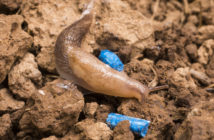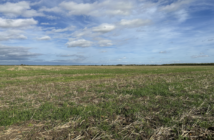A Yorkshire farmer believes biologicals have played a key role in boosting the overall health of his potato crop.
Richard Smith from Bamburgh Grange Farm near Doncaster has been applying calcium phosphite to his 320ha of potatoes for the past five years to help his crop cope with fluctuating weather pattens and periods of stress.
At a time when the cost of inputs has rocketed and cost of living has soared, tailored nutrition and biologicals provide a cheaper means of boosting plant nutritional health and resilience.
“Risk management in the potato business is relatively simple to talk about but very difficult to do,” Richard says.
“The cost of growing the crop is now enormous and the risks associated are also huge. We’ve got to cover some of that risk somehow. That means investment in new technologies and trying to make everything a bit more robust.”
Mr Smith, a third generation McCain potato farmer and winner of the 2019 McDonald’s Outstanding Farmer of the Year Award, first applies Unical, produced by Unium Biosciences, at planting.
“Biologicals have a part to play in general crop health – keeping them in the mix is important, it’s just vital that you understand where best to use them in your programme and having the flexibility – there’s no point putting them on in hindsight,” he says. “You need to predict where the weather conditions appear to be going and apply them in advance before the problem is there.”
Calfite Extra
A later foliar application of Calfite Extra is applied during the growing season at the onset of tuber bulking.
“Calcium provides general plant health benefits better able to withstand abiotic stress and helps create a healthy root system, so I’m convinced it’s the right thing to do,” he says. “Especially as it’s so cost effective.”
As well as playing a key role in bolstering crops so they can withstand episodes of extreme weather, Mr smith believes biologicals will play a part in helping businesses manage the lack of available pesticides.
“New technology in terms of pesticides just isn’t happening because it’s very expensive to register something and we’re losing an awful lot of the active ingredients we’ve already got. So our toolbox of chemicals in much smaller,” Mr Smith says.
“We need products that can help us keep our crops healthy and that’s where biologicals will come in.”
Mr Smith credits his use of biologicals with boosting the marketability of his potato crop and his overall gross margin.
“They have definitely had an effect on tuber quality which has, in turn, boosted saleable yield and the marketability of my potatoes,” he explains.
“I’m also very positive about the other products Unium Biosciences has in the pipeline – the results I’ve seen look very promising.”




